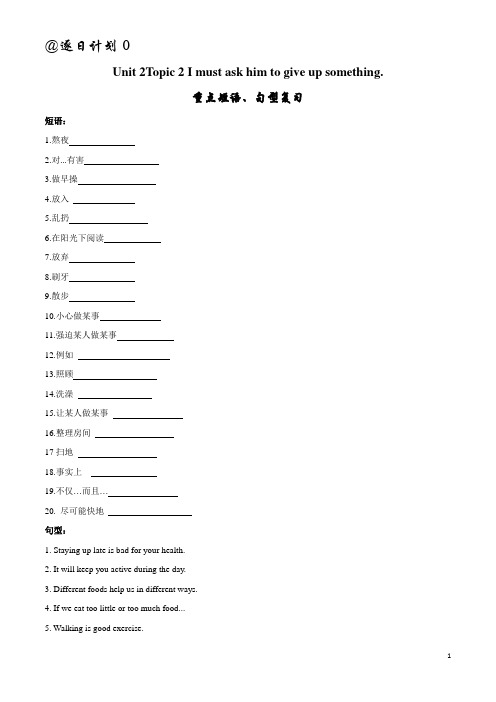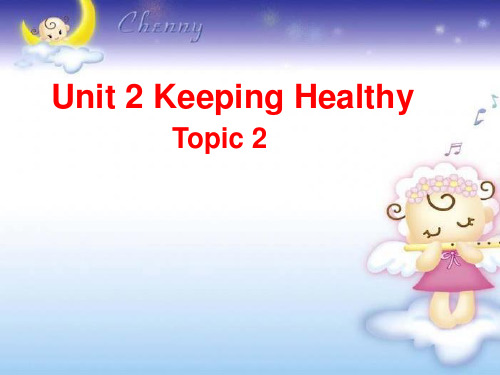2018仁爱英语8年级上册U2Topic2学科讲义(有答案)
仁爱英语八年级U2T2综合复习讲义

Unit 2Topic 2 I must ask him to give up something.重点短语、句型复习短语:1.熬夜2.对...有害3.做早操4.放入5.乱扔6.在阳光下阅读7.放弃8.刷牙9.散步10.小心做某事11.强迫某人做某事12.例如13.照顾14.洗澡15.让某人做某事16.整理房间17扫地18.事实上19.不仅…而且…20. 尽可能快地句型:1. Staying up late is bad for your health.2. It will keep you active during the day.3. Different foods help us in different ways.4. If we eat too little or too much food...5. Walking is good exercise.6 Playing basketball is good for your health.7 Reading in bed is bad for your eyes.知识精讲1. What’s up?= What’s happening ? = What’s wrong? = What’s the matter/trouble? 怎么了?2. Staying up late is bad for your health.(1) stay up = sit up熬夜, 如:we stayed up until midnight to see the New Year coming.(2) 动词ing形式(动名词)可直接放句首作主语,谓语动词用单三形式。
.看太多电视对我们的身体健康是没有好处的。
is not good for=is bad for.做早操对我们的身体是有好处的。
3. too little 太少;too much 太多;都用来修饰不可数名词。
【公开课课件】仁爱版英语八年级上册Unit2 Topic2 (共43张PPT)

play sports right after meals
we shouldn't....
take a shower/ keep the air fresh
we had better....
go to the crowded place
we had better not....
read in the sun
例如:—Must I finish my homework today? —No,you _n_e_e_d_n_'_t __ / Yes,you_m__u_st__.
New words
health n. 健康 (不可数名词)
eg: Good health is very important for us.
we had better not/shouldn't....
Are these habits good or bad?
washing hands doing morning
before meals
exercises
is bad/good for our health.
keeping
going to bed
healthy adj. 健康的 eg: Healthy bodies are very important for us.
tonight n. 今晚,今夜 eg: Tonight is the best time to see the
movie.
adv. 今晚,今夜
eg: They are going to perform tonight.
_G_o__to_b_e_d_e_a_r_ly_a_n_d_g_e_t_u_p_e_a_r_ly_. _ It will keep you active during the day.
2018仁爱英语8年级上册U3Topic2学科讲义(有答案)

【基础知识巩固】一、要点讲评Section A1.I am going to a concert.concern n.音乐会短语: ①go to a concert 去听音乐会②give/ hold a concert 举行音乐会③at a/the concert 在音乐会上我们上星期天去音乐厅听音乐会了。
We went to a concert at the Music Hall last Sunday.2.Hmm … I can lend you some CDs of her songs.呣,我可以借给你一些她的歌曲光盘。
lend v.借给,借出(1)lend sb. sth. = lend sth. to sb. 把某物借给某人(2)borrow sth. from sb./some place 从某人/地那里借进某物Eg: 你能把铅笔借给我吗?Can you ___________ your pencil?= Can you _______ your pencil ________?lend me lend to me昨天我向他借了5元钱。
I ____________ five yuan ____________ yesterday. borrowed from him3.表示“演奏... 乐器前”时,乐器前要用the, 如:play the piano; 表示进行球类运动时,球类前不用the,如:play basketball放学后他们常打篮球。
They always play basketball after school.她钢琴弹得很好。
She plays the piano beautifully.但是,若只作为名词单独使用时,无论是乐器还是球类前都可以加theThe violin looks very nice.那把小提琴看起来不错。
Where is the soccer?足球在哪儿?Section B1.What kind of music do you like?It’s hard to say. 很难说。
仁爱版八年级英语上册-Unit-2-Topic-2-Section-A-课件(共32张PPT)

6. --I have a headache. ---___B___
A.I’m sorry to. B. I’m sorry to hear that. C. I’m sorry for D. I’m sorry.
7.--What’s wrong with Kangkang?
--He __A_____ tired.
□
□
7. going to school without breakfast
W__e__sh_o_u_l_d__h_a_v_e_b__re_a_k_f_a_s_t__b_e_f_ore we go to school.
□
□
8. brushing teeth twice a day
___________________________
1. 动名词作主语,谓语用第 三人称单数(be用is )的用 法。
2. Learn the modal verbs: 情态动词must/mustn’t.
1、抄写新单词 2、列举出五种对身体健康有 益的生活习惯。
单项选择: 1.—Which habit(习惯) is bad for
your health? —__B____
Yous_h_o_u_ld_n_’_t_/_m_u_s_t_n_’t(should/ shouldn’t)/
( must/ / mustn’t)smoke .
Because it __is__b_a_d___fo__r__our healh .
shouldn’t
He ____________(should/ shouldn’t)read in the sun.
仁爱版八年级英语上册 Unit 2 Topic 2 Section
仁爱英语八年级上册第二单元unit2-topic-2-课文知识点讲解

仁爱英语八年级上册第二单元unit2-topic-2-课文知识点讲解仁爱英语八年级上册第二单元unit2 topic 2 课文知识点讲解Section A重点句型及知识点讲解1.I watched a soccer game last night and went to bed very late. 昨天晚上我在电视上看了场足球赛,很晚才上床睡觉。
watch 主要用于观看电视节目、球赛、游戏和话剧等。
如:We watched a play in the theater yesterday. 昨天我们在剧院看了一场话剧。
【辨析】(1)read 主要用于读书、看报等。
如:My mother likes reading newpapers. 我妈妈喜欢看报纸。
(2)see 和watch 有相似之处,用于观看比赛、电视节目、演出、电影等。
但see主要强调看的结果。
____________________________________________________我经常看见你在暑假期间打篮球。
(3)look意为“看、瞧”是不及物动词,强调动作。
如:Please look at the blackboard. 请看黑板。
2. Staying up late is bad for your health. 熬夜很晚对你的健康不利。
(1) stay up 熬夜, 如:we stayed up until midnight to see the New Year coming.(2)在这里staying up 是动名词短语作主语,谓语动词用单数形式。
有时候动名词也可作主语。
如:Dancing is fun. 跳舞是一种乐趣。
Smoking is bad for you. 吸烟对你有害。
(3) be good /bad for 对……有益/害。
如:Walking is good for our health.散步对我们的健康有益。
仁爱版英语八年级上册Unit 2 Topic 2《I must ask him to give up

仁爱版英语八年级上册Unit 2 Topic 2《I must ask him to give up smoking》(SectionC)教学设计一. 教材分析仁爱版英语八年级上册Unit 2 Topic 2《I must ask him to give up smoking》(Section C)主要讲述了如何给朋友提出建议以及如何表达同意和反对的观点。
本节课的主要语言点是掌握表示建议的动词短语如“ask sb to do sth”, “tell sb to do sth”, “make sb do sth”等,以及表示同意和反对的短语如“I agree with you”, “I don’t think so”, “I’m sure he will”等。
同时,本节课还涉及到日常生活中的健康问题,如吸烟、喝酒等不良习惯。
二. 学情分析八年级的学生已经掌握了基本的英语语法和词汇,具备一定的听说读写能力。
但是,学生在实际运用英语进行交流时,还存在着一定的困难,特别是在表达建议和观点方面。
因此,在教学过程中,教师需要结合学生的实际情况,创设真实的学习情境,引导学生运用所学知识进行实际交流。
三. 教学目标1.知识目标:–掌握表示建议的动词短语如“ask sb to do sth”, “tell sb to do sth”, “make sb do sth”等。
–掌握表示同意和反对的短语如“I agree with you”, “I don’t think so”, “I’m sure he will”等。
–了解日常生活中的一些不良习惯及其危害。
2.能力目标:–能够用英语就日常生活中的一些问题提出建议和观点。
–能够听懂并参与到相关的英语交流活动中。
3.情感目标:–培养学生关爱他人,关注他人健康的意识。
–培养学生积极向上的生活态度。
四. 教学重难点•掌握表示建议的动词短语如“ask sb to do sth”, “tell sb to do sth”, “make sb do sth”等。
仁爱版八年级上册unit2-topic2-Section-A

The main activities are 1a and 3a. 本课重点活动是1a和3a。
Ⅰ. Teaching aims and demands 教学目标1. Learn some new words:cause, health, tonight, sleepy, medicine, meal, without2. Learn some knowledge of healthy habits and unhealthy habits:(1)Staying up late is bad for your health.(2)—Is going to bed early good or bad for our health?—It’s good.3. Get to know that it’s necessary for us to have healthy habits.Ⅱ. Teaching aids 教具多媒体课件/小黑板/录音机/幻灯片Ⅲ. Five-finger Teaching Plan 五指教学方案Step 1 Review 第一步复习(时间:6分钟)复习Topic 1中有关疾病的话题,导入生活习惯与健康的话题。
导入新课。
1. (采用由浅入深的方式,复习Topic 1所学的关于表达疾病及建议的方式。
首先以师生问答的形式帮助学生回忆。
)T: Boys and girls, today I’m not feeling well. If I have a toothache, what should I do?S1: You should go to see a dentist.T: If I have a headache, what should I do?S2: You’d better stay in b ed and have a good rest.T: If I have a cold, what should I do?S3: You’d better go to see a doctor.…T: You are very clever!(通过问题的进一步深入,引导学生说出更多的建议方式,最后由学生以对话形式表演出以上疾病和建议内容。
2018仁爱英语8年级上册U1Topic2学科讲义(有答案)

【基础知识巩固】一、重、难点1.Michael, could you please do me a favor? 迈克,你愿意帮我一个忙吗?(1)Could you please = Would you please…? 意为“请你…好吗?”后接动词原形。
(2)do sb. a favor= help sb.= give sb. a hand 帮某人的忙。
2.But one of my teammates fell ill。
但是我们队友中的一员病了。
(1)One of +可数名词复数,表“….. 中之一”当它作主语时,是单数第三人称。
如:One of my friends likes playing computer games 类似的短语有:Some of …;中的一些most of…中的大多数;(2)fall ill 生病(强调动作,身体由健康到生病的过程)be ill 病了(强调状态)feel ill感觉不舒服(身体感受) 如:He fell ill yesterday, and now he is ill in bed.昨天他生病了,现在正病怏怏的在床上躺着。
She is ill now.她正病着。
Don’t work too hard, or you will fall ill.工作不要太辛苦了,否则你会生病的。
Are you feeling ill?你现在觉得不舒服吗?3.—Would you mind teaching me ?— Not at all.—介意教教我吗?—不介意。
(1)Would you mind (not)doing sth. 你介意(别)做某事吗?(礼貌地请求某人做或别做某事)回答去做的有:Not at all 或Of course not或Certainly not 回答不去做的有:Sorry,I won’t ./Yes, please don’t./ You’d better not.(2)Would you mind doing sth.= Would you mind+if从句,如:Would you mind my/me smoking here?= Would you mind if I smoke here? 4. That’s very kind of you, but I can manage it myself.太感谢你了,但我会自己处理的。
- 1、下载文档前请自行甄别文档内容的完整性,平台不提供额外的编辑、内容补充、找答案等附加服务。
- 2、"仅部分预览"的文档,不可在线预览部分如存在完整性等问题,可反馈申请退款(可完整预览的文档不适用该条件!)。
- 3、如文档侵犯您的权益,请联系客服反馈,我们会尽快为您处理(人工客服工作时间:9:00-18:30)。
【基础知识巩固】一、重、难点1.I must ask him to give up smoking.give up 是放弃的意思,后面跟动词作宾语时,要用动名词。
give up doing sth. = stop doing sth. 放弃做某事Eg: You should give up smoking.=You should stop smoking. 你应该戒烟。
give up 属于动词和副词构成的短语,接代词作宾语时要把代词放在动词和副词之间。
Eg: Give it up. 放弃它。
我们学过的类似短语有:pick up 捡起,拾起;try on 试一试;put away 收好;wake up 唤醒2. It will keep you active during the day.(1)keep + 宾语+ 补语(补语可以是:动词ing 形式;形容词;副词;介词短语)①I’m sorry to keep you waiting for such a long time. (keep sb. doing sth.使某人一直做某事)②Keep the door open, please. (keep sb/sth+形容词,表示某人/某事物保持怎样的状态)③Once a cold keep the child in bed for three days (keep sb+介词短语,表示某人呆在某地)④You had better keep the children away from the fire.(2) during the day = in the daytime 在白天3. It may show that something is wrong with your health.show. v. 出示,显示。
(1) show sb. sth. = show sth. to sb. 向某人展示某物Please show me your new book.请让我看一看你的新书。
(2) show sb. around 带某人参观某地I’ll show you around our school tomorrow.明天我将带你参观我们学校。
4. It’s necessary for us to have healthy eating habits.句型:It is + 形容词+ for sb. to do sth. (it代替后面的不定式) 对于某人来说,去做某事是…的,如:It’s useful for us to learn English well.5.Mr. Smith drinks enough water every day.enough. adj. 意为“足够的,充分的”。
在句中作宾语,可放在名词前。
Eg: I have enough time to do it.enough. adv. 意为“足够地,充分地”,通常放在被修饰的形容词或副词后面。
Eg: This book is easy enough for him.常用结构为:adj. /adv. enough for sb to do.Eg: This book is easy for him to read.6. Be careful not to eat too much salt or sugar.be careful (not) to do sth. 当心(不)要做某事。
Eg: Be careful to cross the road.Be careful not to drive too fast.7.Jane didn’t like it, but her mother always forced her to drink it.force sb to do sth. 强迫某人做某事。
Eg: The policeman force him to stay in the room.8.Every morning before she left for school, she had to drink a glass of milk because her mother was always watchiong her.be always doing sth. 老是、一再地做某事。
带有一定的感情色彩。
Eg: He is always forgetting my name.9.But his mother made him taste it.make sb do sth. 使某人做某事。
Eg: The monkey makes us laugh.10.He was surprised to find that it was delicious!be surprised to do sth. 很惊讶地做某事。
Eg: I’m surprised to see him here.重点词组或短语:in the sun 在阳光下go for a walk 去散步take a walk = have a walk 散步throw around到处扔in fact 事实上Stay up 熬夜on an empty stomach 空腹get into 进入,陷入(get into trouble 陷入麻烦)as we know = it is well know众所周知in different ways 以不同的方式as soon as 一……就……,尽快not only... but (also)...语法精讲—情态动词1.Must 情态动词,意为“必须,应该,一定要”,后面接动词原形。
(1) 表示说话人的意志和义务。
或表示说话人强烈的要求和命令。
多用于肯定句或疑问句。
We must study hard.You must say sorry to me for that.(2) must 的否定式为must not,缩写为mustn’t,表示“不应该,不准,禁止”等。
构成疑问句时只需将must置于主语前,在句尾加问号。
肯定回答用must,否定回答用needn’t或don’t have to。
You mustn’t throw litter around.—Must I go now?—Yes, you must./No, you nee dn’t/don’t have to.(3) must 可以用来表示有把握的推测,其否定式为can’t。
如:The light is still on. He must be at home.The light isn’t on. He can’t be at home.2.may 情态动词,意为“可以”的意思.(1) 表示允许或征询对方的许可。
如:May I come in ?You may borrow my bike.—May I wait at here?—Yes, you may./No, you mustn’t/can’t.肯定回答用Yes, you may. 否定回答用No, you mustn’t./No, you can’t.此时可与can互换。
(2)表示推测,常用于肯定句中,暗含不确定。
如:It may be sunny later.3.Can(1) 表示能力,意为“能,会”的意思。
可和be able to 互换。
I can fly a kite.I can make some model cars.(2)表示允许,意为“可以,能够”,在口语中代替may。
Can I use your pen?Can I smoke here?(3)表示可能性,常用于否定句或疑问句中。
如:Can it be true?—Can that man be our teacher?—No, he can’t be our teacher. I saw our teacher in the office just now..【典型例题讲解】( )1. —Watching TV too much _______ bad for your eyes.—I’ll go to be d right away.A. isB. areC. wasD. be( )2. —I’m fat. What should I do?—You’d better eat _______ meat and _______ fruits.A. less; moreB. less; lessC. more; lessD. more; more( )3. —I am afraid we will miss the early bus.—Don’t worry. W e have _______ time to do it.A. fewB. enoughC. littleD. many( )4. _______ necessary for us _______ English well.A. This is; to learnB. It’s; to learnC. It’s; learnD. That’s; learn( )5. —You’d better not read _______. It’s bad for your e yes.—You’re right. I won’t do that again.A. in the sunB. under the sunC. on the sunD. above the sun( )6. —Humans can’t live _______ air.—I agree with you.A. withoutB. withC. inD. for( )7. You are weak. _______ important for you _______ every day.A. They’re; to exerciseB. It’s; to exerciseC. They’re; exercisingD. It’s; exercising( )8. —Scientists tell us smoking can cause cancer.—_______A. OK.B. That’s a good idea.C. It’s really terrible.D. It doesn’t matter.( )9. You had better ask your brother _______ playing computer games. It’s bad for him.A. to give upB. not to give upC. to give it upD. not give it up( )10. Sugar tastes sweet. But, _______, it’s bad to eat too much.A. such asB. for exampleC. in factD. though【随堂练习巩固】Ⅱ. 情景交际。
